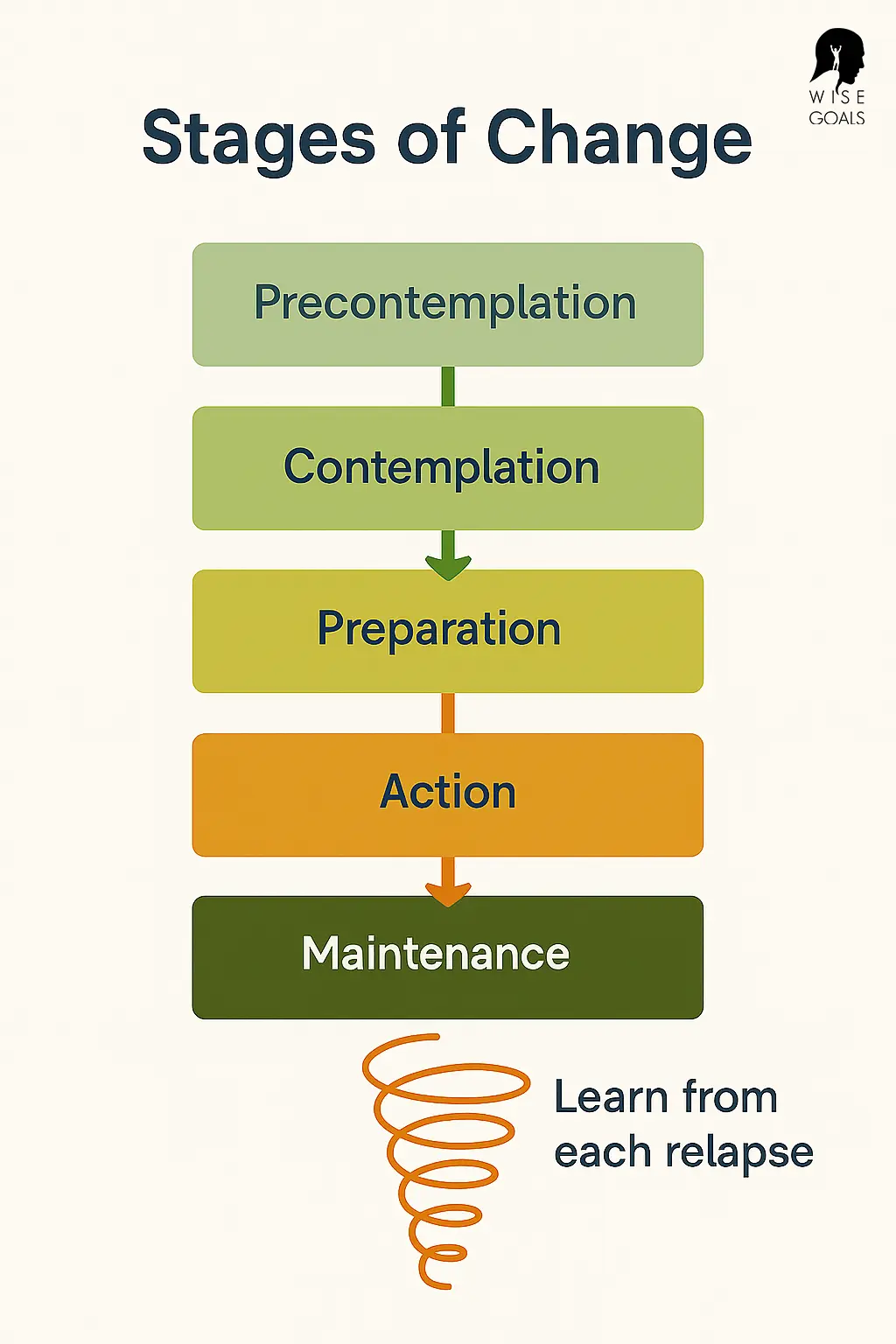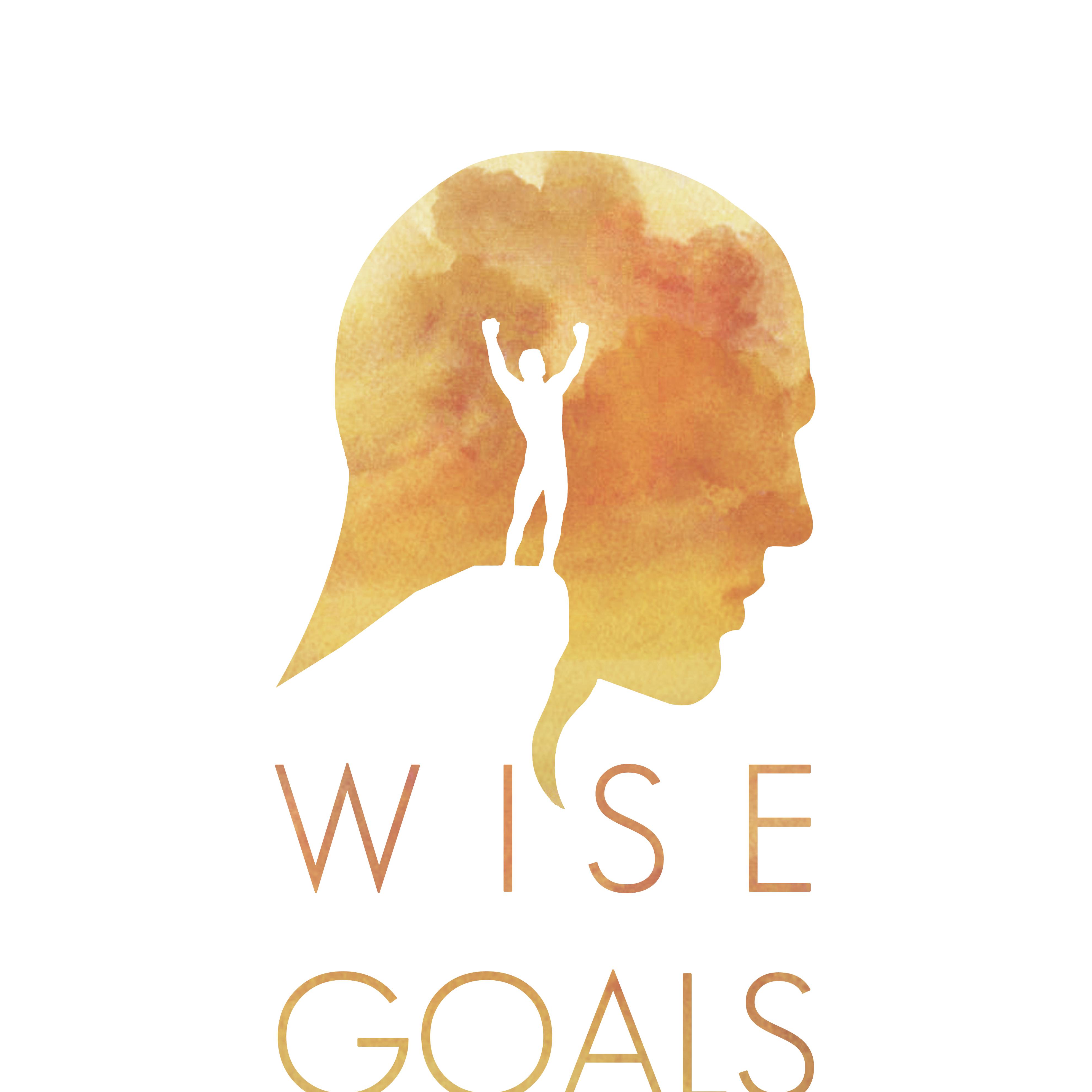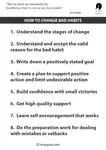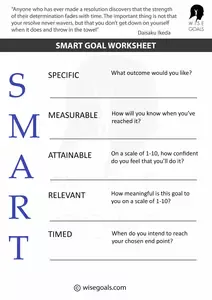- Home
- Learn Goal Setting
- Stages of Change Model
Using The Stages of Change Model to Support Goal Progress
If you've ever set a goal and struggled to follow through, you're not alone. There’s a reason willpower alone often isn’t enough — and it might be simpler (and kinder) than you think.
The Stages of Change model, developed by psychologists Prochaska and DiClemente, is a research-backed framework that helps you understand where you are in your change process — and what kind of support or strategy you need next.
Let’s take a closer look at the model, how it works, and how it can transform the way you pursue your goals.

What Is the Stages of Change Model?
The Stages of Change Model, also known as the Transtheoretical Model, outlines six stages that people typically move through when making a behavioural or personal change.
It’s not a strict linear path. In fact, most people cycle through these stages more than once — and that’s part of the process.
The six stages are:
1. Precontemplation: “I’m not thinking about changing”
In this stage, you might not yet see a need for change — or feel resistant to it. Maybe others are suggesting change, but it doesn’t feel urgent or necessary to you.
This doesn’t mean you’re lazy or unmotivated. It means you’re not ready yet — and that’s okay.
Support tip: Compassionate awareness matters here. Change often begins with feeling seen, not pushed.
2. Contemplation: “I’m thinking about it”
Here, you’re starting to acknowledge the possibility of change. You’re weighing the pros and cons, imagining what life might look like if you did things differently.
But you might still feel ambivalent — and that’s normal.
Support tip: Gentle reflection and open-ended questions help here. Coaching and journaling can be especially powerful in this stage.
3. Preparation: “I’m planning for it”
In this stage, you’ve moved from thinking to preparing. You may be researching, exploring options, setting a date, or even dipping your toe into action.
You may still have doubts, but the desire to move forward is growing stronger.
Support tip: Create structure. Identify small steps. Build in support (like coaching, check-ins, or routines).
4. Action: “I’m doing the thing”
Now you’re making the change. This might involve new habits, conversations, boundaries, routines — anything that moves you toward your goal.
This stage is energising, but also demanding. You might feel excitement and vulnerability all at once.
Support tip: Celebrate every small win. Stay connected to your “why.” Be gentle if momentum dips.
5. Maintenance: “I’m sustaining the change”
This stage is all about integration. You’ve made the shift — now you’re working to keep it going.
This might involve dealing with setbacks, refining your strategy, or finding joy in consistency.
Support tip: Build routines that support your identity. Reflect on progress. Reinforce what’s working.
6. Relapse (or Recycling): “I slipped” — and that’s normal
Many people cycle back through earlier stages. Relapse doesn’t mean failure — it means you're human. The key is to meet it with curiosity, not self-criticism.
Support tip: Revisit your intentions. What pulled you off course? What might support you better this time around?
Why This Model Matters for Goal Setting
In the WiseGoals approach, we believe goals should feel safe, energising, and aligned with who you are. The Stages of Change model supports that philosophy by:
- Normalising the non-linear path
- Reducing self-judgment when motivation dips
- Helping you match your strategies to your actual stage
So instead of pushing for action when you're actually still in contemplation, you get to honour where you are. And that makes change more sustainable.
Real-Life Example: How the Model Can Shift Your Approach
Let’s say your goal is to start meditating daily.
If you’re in precontemplation, you might say: “Meditation’s not for me.”
In contemplation: “I’ve read about it. Maybe it would help.”
In preparation: “I downloaded an app. I’ll start Monday.”
In action: “I’m meditating 10 minutes a day!”
In maintenance: “I’ve made it part of my routine.”
In relapse: “I stopped during a busy week. I want to try again.”
Each of those stages needs a different kind of support. And recognising that can turn frustration into focus — and shame into strategy.
How to Use the Stages of Change Model for Your Goals
Here’s a simple 3-step process to apply the model right now:
1. Identify your current stage
Pick a goal you care about. Then ask yourself:
Which of these six stages am I in right now — honestly?
No shame. Just truth.
2. Name what that stage needs
For example:
- Contemplation might need more reflection or emotional safety
- Preparation might need a checklist or plan
- Maintenance might need systems or support
3. Take one small step
No leap required. Just a single step that’s aligned with your stage.
This could be:
- Journaling why the goal matters (Contemplation)
- Signing up for a class (Preparation)
- Telling a friend for accountability (Maintenance)
Why Self-Compassion Is Crucial
One of the most powerful parts of this model is how it invites self-understanding over self-judgment.
Instead of thinking:
“I failed because I didn’t take action,”
you might realise:
“I was in contemplation — I wasn’t ready yet.”
That insight alone can change everything.
Final Thoughts
Personal change isn’t a straight road. It’s a winding, repeating, evolving process. And that’s not a flaw — it’s how real growth works.
The Stages of Change model doesn’t just show you where you are. It helps you move forward with more self-awareness, more strategy, and more kindness.
Because when your goals are aligned with your psychology — and your heart — change becomes not only possible, but sustainable.
Affiliated With
We are proud to be part of professional networks that value evidence-based practice, inclusion, and social impact.














